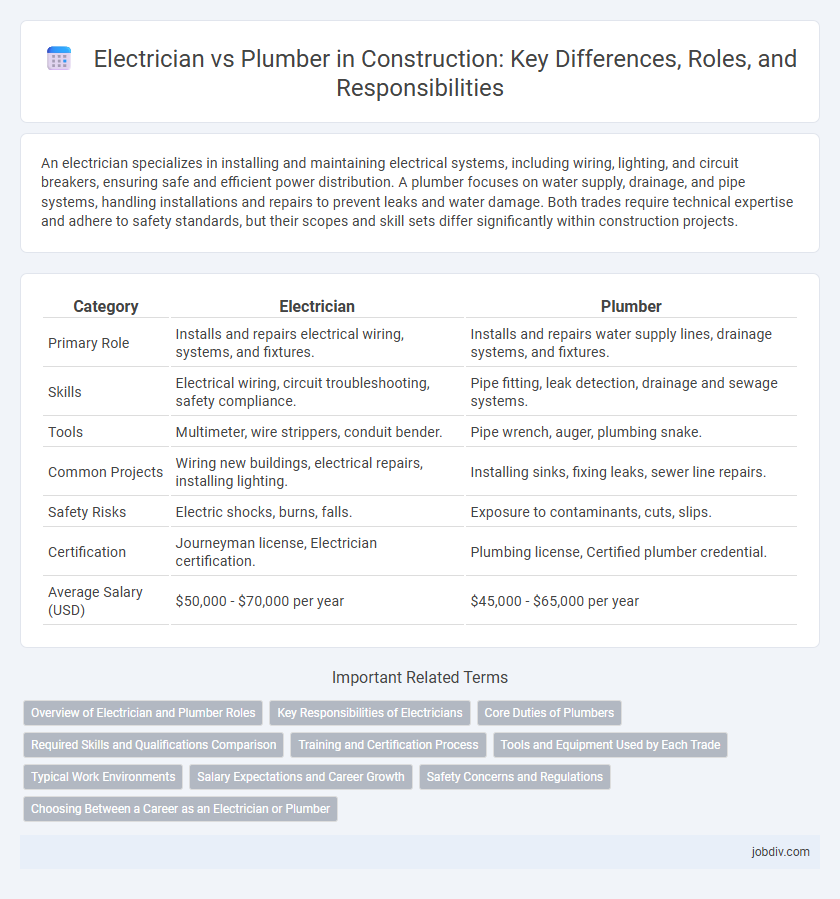An electrician specializes in installing and maintaining electrical systems, including wiring, lighting, and circuit breakers, ensuring safe and efficient power distribution. A plumber focuses on water supply, drainage, and pipe systems, handling installations and repairs to prevent leaks and water damage. Both trades require technical expertise and adhere to safety standards, but their scopes and skill sets differ significantly within construction projects.
Table of Comparison
| Category | Electrician | Plumber |
|---|---|---|
| Primary Role | Installs and repairs electrical wiring, systems, and fixtures. | Installs and repairs water supply lines, drainage systems, and fixtures. |
| Skills | Electrical wiring, circuit troubleshooting, safety compliance. | Pipe fitting, leak detection, drainage and sewage systems. |
| Tools | Multimeter, wire strippers, conduit bender. | Pipe wrench, auger, plumbing snake. |
| Common Projects | Wiring new buildings, electrical repairs, installing lighting. | Installing sinks, fixing leaks, sewer line repairs. |
| Safety Risks | Electric shocks, burns, falls. | Exposure to contaminants, cuts, slips. |
| Certification | Journeyman license, Electrician certification. | Plumbing license, Certified plumber credential. |
| Average Salary (USD) | $50,000 - $70,000 per year | $45,000 - $65,000 per year |
Overview of Electrician and Plumber Roles
Electricians install, maintain, and repair electrical systems, ensuring safe and efficient power distribution in residential, commercial, and industrial buildings. Plumbers specialize in installing and fixing water supply lines, drainage systems, and sewage connections to maintain proper water flow and sanitation. Both trades require technical expertise and adherence to safety standards, but electricians focus on electrical currents while plumbers handle water and waste systems.
Key Responsibilities of Electricians
Electricians are responsible for installing, maintaining, and repairing electrical systems in residential, commercial, and industrial buildings. They ensure the safe and efficient functioning of wiring, outlets, circuit breakers, and lighting fixtures while adhering to building codes and safety regulations. Electricians also troubleshoot electrical malfunctions, perform inspections, and upgrade systems to meet current electrical standards.
Core Duties of Plumbers
Plumbers specialize in installing, repairing, and maintaining piping systems that supply water, gas, and waste evacuation in buildings. Their core duties include fixing leaks, unclogging drains, installing fixtures like sinks and toilets, and ensuring compliance with local plumbing codes. Unlike electricians who focus on electrical wiring and systems, plumbers handle the critical infrastructure for sanitation and water delivery essential for building functionality.
Required Skills and Qualifications Comparison
Electricians require in-depth knowledge of electrical systems, circuit design, and safety regulations, often holding certifications such as Journeyman or Master Electrician licenses. Plumbers must be skilled in pipefitting, water supply systems, and code compliance, typically requiring state-specific plumbing licenses or apprenticeships. Both professions demand strong problem-solving abilities, manual dexterity, and adherence to local building codes to ensure safe and efficient construction outcomes.
Training and Certification Process
Electricians undergo rigorous training that typically includes completing an apprenticeship of 4 to 5 years, combining on-the-job experience with classroom instruction focused on electrical systems, safety protocols, and code compliance. Plumbers also complete apprenticeships of similar duration, emphasizing pipefitting, water systems, waste management, and local plumbing codes, often followed by journeyman exams for certification. Both professions require licensing exams that test practical skills and knowledge, ensuring compliance with industry standards and safety regulations.
Tools and Equipment Used by Each Trade
Electricians utilize tools such as wire strippers, multimeters, conduit benders, and voltage testers to install and maintain electrical systems. Plumbers rely on pipe wrenches, pipe cutters, plungers, and augers to install and repair piping systems for water, gas, and drainage. Each trade requires specialized equipment tailored to their specific tasks, ensuring efficiency and safety during construction projects.
Typical Work Environments
Electricians commonly work in residential, commercial, and industrial settings, often navigating confined spaces, elevated structures, and outdoor sites to install, maintain, and repair electrical systems. Plumbers typically operate in similar environments but focus on residential homes, commercial buildings, and infrastructure projects, handling water supply lines, drainage, and sewage systems within walls, underground pipes, and utility rooms. Both professions require adherence to safety standards and use specialized tools specific to their trade in varied construction site conditions.
Salary Expectations and Career Growth
Electricians typically earn between $50,000 and $70,000 annually, with opportunities for higher wages through specialization in areas like industrial or commercial wiring. Plumbers show strong salary growth potential as well, with median wages around $56,000 and increased demand for skills in new construction and green technologies. Both careers offer robust career advancement through certifications and apprenticeships, but electricians often experience faster salary escalations due to higher demand in emerging electrical systems.
Safety Concerns and Regulations
Electricians and plumbers face distinct safety concerns and regulatory requirements due to the nature of their work environments; electricians must adhere to strict electrical codes and use insulated tools to prevent shocks and fires, while plumbers comply with plumbing codes to avoid water contamination and structural water damage. Both professions require comprehensive training in local building codes, Occupational Safety and Health Administration (OSHA) standards, and the proper use of personal protective equipment (PPE) to minimize risks. Regular inspections and certifications ensure compliance, with electricians focusing on electrical panel safety and plumbers emphasizing pipe integrity and pressure management.
Choosing Between a Career as an Electrician or Plumber
Choosing between a career as an electrician or plumber depends on individual skills and industry demand, with electricians specializing in electrical systems installation and maintenance, while plumbers focus on piping and water systems. Both trades offer lucrative job opportunities, but electricians often face higher risks related to electrical hazards, whereas plumbers deal with physical labor and potential exposure to unsanitary conditions. Career growth potential is strong in both fields, with electricians benefiting from expanding renewable energy technology integration and plumbers experiencing consistent demand in residential and commercial construction.
Electrician vs Plumber Infographic

 jobdiv.com
jobdiv.com